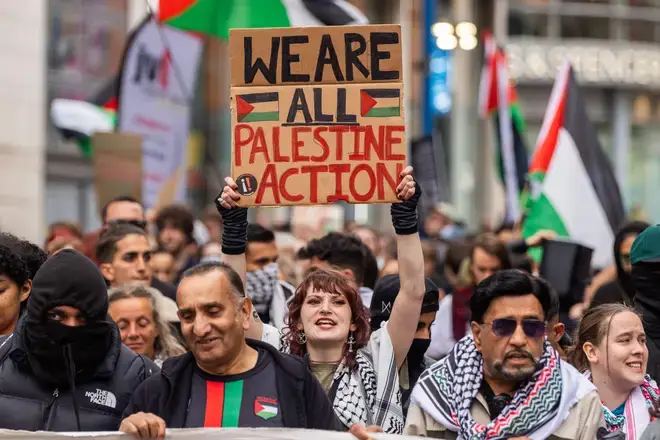Two more men have been arrested after two planes at an RAF base were vandalised in an action claimed by soon-to-be banned campaign group Palestine Action.
Counter Terrorism Policing South East said the men, aged 22 and 24 and both from London, were arrested on Saturday afternoon under the Terrorism Act.
The two are held on suspicion of the commission, preparation or instigation of acts of terrorism, contrary to Section 41 of the Terrorism Act 2000.
It brings the total number of arrests to six, after the direct action group Palestine Action claimed responsibility for the break-in.
The group released a video of the incident online, which showed two activists spraying paint onto two military aircraft in a high-profile security breach at the UK’s largest airbase.
On Thursday, police said a woman, aged 29 of no fixed address, and two men, aged 36 and 24 from London, had been taken into police custody after the incident at RAF Brize Norton on June 20.
A 41-year-old woman, of no fixed address, was also arrested on suspicion of assisting an offender, they previously said.
The video footage posted online shows the activists riding electric scooters across the runway before targeting two Airbus Voyager aircraft – spraying red paint into their engines using repurposed fire extinguishers.
Palestine Action says it was a direct intervention to halt British support for Israel, claiming the UK is “an active participant” in the “genocide” in Gaza.
The group said: “Despite publicly condemning the Israeli government, Britain continues to send military cargo, fly spy planes over Gaza and refuel US/Israeli jets. By decommissioning two military planes, we’ve broken the chains of oppression.”
After the break-in, Home Secretary Yvette Cooper confirmed the government's decision to ban Palestine Action, which will make it illegal to be a member of the group or show support for it, and is punishable by a maximum sentence of 14 years in prison.
Many have criticised the drastic measure, claiming it violates the right to protest and free speech.
Pro-Palestine protesters ‘damage RAF planes at Brize Norton’
Palestine Action has staged a series of demonstrations in recent months, including spraying the London offices of Allianz Insurance with red paint over its alleged links to Israeli defence company Elbit, and vandalising US President Donald Trump’s Turnberry golf course in South Ayrshire.
As a result of their sustained direct action campaign, several firms that supply military technology to the Israeli army have been forced to shut down premises in the UK.
Met Commissioner Sir Mark Rowley backed the Home Secretary's move to proscribe Palestine Action, describing it as an "organised extremist group".
"I know people talk about it as Direct Action protest but it is a euphemism for criminality," he added on LBC's Nick Ferrari At Breakfast.
Sir Mark said Palestine Action was responsible for assaulting officers and committing "mass amounts" of criminal damage.
Former Scottish First Minister Humza Yousaf agreed that some of their actions might be unlawful, but said banning the group is "a shameful and dangerous misuse of anti-terror legislation by the UK Government."
Palestine Action explains reason behind RAF base break-in
"Regardless of whether you agree with their tactics, one thing is clear: Palestine Action are very obviously not a terrorist organisation," he wrote for LBC Opinion.
Referring to the Brize Norton break-in, he added: "You may support that kind of protest, or you may find it counterproductive or even oppose it robustly. That’s a legitimate debate.
"But to suggest that this kind of action constitutes terrorism? That’s an insult to our intelligence and a grave distortion, and abuse, of laws designed to keep us safe from the violent activities of genuine terrorists."
The former SNP leader added: "This move by the UK Government is not about protecting the public, it’s about punishing political protest. It’s about silencing those who are calling out Britain’s complicity in war crimes. It is a threat not just to Palestine Action, but to every citizen who believes in our rights and freedoms."
Was the Home Secretary right to ban Palestine Action?
A spokesperson for Palestine Action previously accused the UK of failing to meet its obligation to prevent or punish genocide.
The spokesperson said: “When our Government fails to uphold their moral and legal obligations, it is the responsibility of ordinary citizens to take direct action. The terrorists are the ones committing a genocide, not those who break the tools used to commit it.”
The Home Secretary has the power to proscribe an organisation under the Terrorism Act of 2000 if she believes it is “concerned in terrorism”. Proscription will require Home Secretary Yvette Cooper to lay an order in Parliament, which must then be debated and approved by both MPs and peers.
Some 81 organisations have been proscribed under the 2000 Act, including Islamist terrorist groups such as Hamas and al Qaida, far-right groups such as National Action, and Russian private military company the Wagner Group.
Belonging to or expressing support for a proscribed organisation, along with a number of other actions, are criminal offences carrying a maximum sentence of 14 years in prison.
This is a breaking story, please refresh for the latest update.

